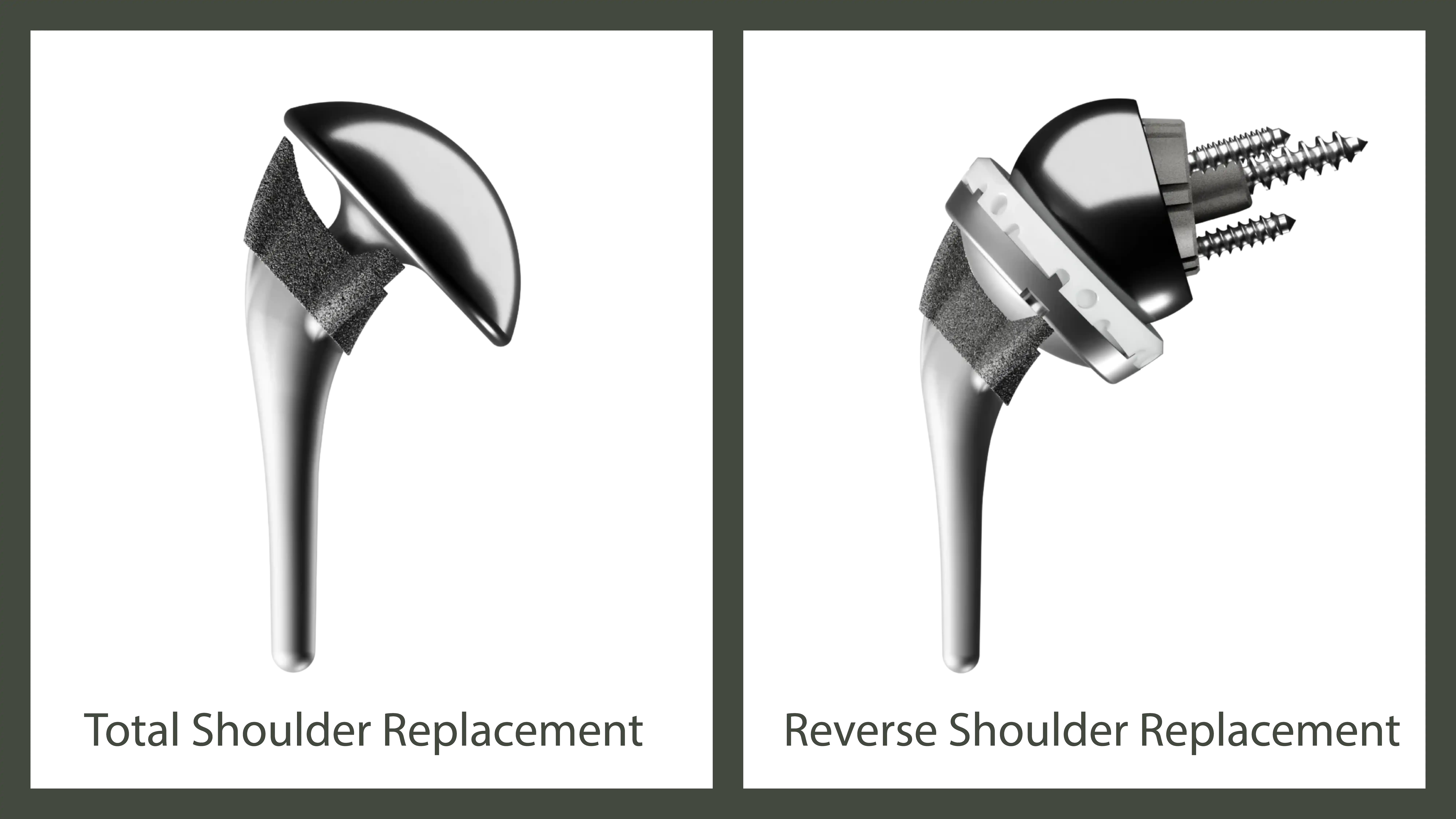The Serious Risks of Delaying Shoulder Replacement Surgery
Thinking about delaying shoulder replacement surgery? Risks of delaying include increased pain, reduced mobility, and permanent joint damage. In this post, we’ll dive into why acting sooner rather than later is important for maintaining your health and quality of life.
Key Takeaways
- Delaying shoulder replacement surgery can lead to increased pain, decreased mobility, and a significant decline in quality of life, highlighting the importance of timely intervention.
- Long-term consequences of postponing surgery include progressive joint damage and muscle atrophy, which complicate future surgical options and recovery success.
- Consulting a shoulder specialist is essential to accurately assess the condition and make informed decisions regarding the timing and necessity of surgery.
Understanding Shoulder Replacement Surgery
Shoulder replacement surgery involves removing damaged parts of the shoulder joint and replacing them with metal and plastic components. This surgery is often recommended for those suffering from conditions like osteoarthritis, shoulder arthritis, rotator cuff injuries, and rheumatoid arthritis. The ultimate goal is to alleviate pain, restore function, and improve the patient’s quality of life.

There are different types of shoulder replacements, depending on the extent of damage. Anatomic shoulder replacements mimic the natural anatomy of the joint, while reverse shoulder replacements switch the positions of the humeral head and socket, a technique particularly beneficial for severe rotator cuff tears.
Implants come in various shapes and sizes to accommodate individual patient needs, ensuring the best possible outcomes.
Immediate Impacts of Delaying Surgery
Postponing shoulder replacement surgery can have significant, often debilitating consequences for your health and daily life. The most noticeable immediate impact is the worsening of joint pain and discomfort. The limitations in shoulder movement can make everyday tasks increasingly difficult, leading to a decline in your overall lifestyle and independence.
Many patients who delay their surgery often express regret, wishing they had undergone the procedure sooner, due to the negative impact on mobility and functionality.
Increased Pain and Discomfort
One of the most immediate consequences of delaying shoulder replacement surgery is escalating pain levels. The pain often becomes persistent, interfering with work, hobbies, and even sleep. Inflammation and swelling can increase. Many patients turn to pain medications for temporary relief, but these often do not address the root cause of the pain and may cause side effects or dependency.
Limited Mobility and Function
Delaying shoulder replacement surgery can limit mobility and function. The progressive loss of flexibility and movement makes it increasingly difficult to perform everyday tasks, such as dressing, cooking, or even lifting objects. Weakened muscles and tendons due to inactivity from pain further contribute to stiffness. As mobility decreases, reliance on others for assistance often increases.
Long-Term Consequences
When shoulder replacement surgery is postponed, patients risk several long-term consequences that may be irreversible. Over time, the shoulder joint continues to deteriorate, leading to chronic pain and further complications. As conditions worsen, future surgeries become more complex and less likely to succeed.
Timely intervention can halt further deterioration and improve long-term outcomes. Delaying surgery only exacerbates the situation, making recovery more challenging and less effective in the long run.
Progressive Joint Damage
If shoulder replacement surgery is postponed, further damage to the natural shoulder joint can occur. The wear and tear of cartilage may lead to bone-on-bone contact, causing severe pain. Additionally, this can cause muscle weakening as patients naturally limit their movement to avoid pain.
The deterioration of the shoulder joint over time can have serious consequences on joint health. The longer the surgery is delayed, the more difficult it becomes to repair the damage effectively.
Muscle Atrophy
Muscle atrophy is another consequence of delaying shoulder replacement surgery. Inactivity due to pain can lead to a loss of muscle mass and strength, known as muscle atrophy. As the muscles weaken, the chances of a successful recovery post-surgery diminish, making it harder to regain full function.
Complicated Future Surgeries
Complications from delaying shoulder replacement surgery can make future procedures more difficult and less successful. The increased joint damage and muscle weakening that occur over time result in more complex surgical interventions.
More severe damage means a more challenging recovery and a higher risk of complications during and after surgery. In some cases, additional surgical interventions may be required, further prolonging the recovery process.
Impact on Quality of Life
Delaying shoulder replacement surgery can affect physical, emotional, and financial well-being. Persistent shoulder pain restricts daily activities, creating frustration and emotional stress. Economic challenges can also occur, as reduced work productivity may result in lost income and financial instability.
Patients who postpone surgery often face a more challenging recovery process, potentially compromising their long-term outcomes and quality of life.
Daily Activities and Self-Care
Chronic shoulder pain transforms routine activities into exhausting challenges, where assistance is often required. Disrupted sleep due to pain can result in fatigue, compounding these challenges.
Patients may become increasingly reliant on pain medications, which carry risks of side effects and dependency, or require assistive devices to minimize shoulder strain. While these adaptations provide temporary relief, they cannot restore normal function. Timely surgical intervention typically offers more substantial and lasting improvements in mobility and relief, enabling patients to regain independence in their daily lives.
Work and Financial Stability
The workplace consequences of postponed shoulder replacement can be significant. Employees may struggle with reduced productivity, require frequent absences, or face job-specific limitations due to pain and mobility restrictions. This can create financial pressure from lost earnings and instability.
Early surgical treatment can help preserve career continuity and economic security by addressing the root cause of these limitations.
Non-Surgical Alternatives and Their Limitations
Non-surgical options such as physical therapy, medications, and lifestyle changes are usually the initial treatments for mild to moderate shoulder conditions. While non-surgical approaches have value for mild cases and temporary relief, they have limitations and may not be suitable for everyone. For severe conditions, shoulder replacement surgery remains the most effective option.
Physical Therapy
Physical therapy can improve mobility and strengthen surrounding muscles, providing pain relief and improved function. Therapy typically includes personalized stretching and strengthening exercises tailored to individual recovery needs.
While beneficial, physical therapy has limitations for patients with severe shoulder conditions and may not replace the need for surgery.
Medications and Injections
Medications, including non-steroidal anti-inflammatory drugs (NSAIDs), are commonly used to relieve shoulder pain and provide pain relief. However, long-term use of NSAIDs should be monitored by a healthcare professional to avoid complications.
Corticosteroid injections are another option to reduce inflammation and provide temporary relief. However, repeated injections can weaken tendons, highlighting the need for careful medical supervision.
Regenerative Medicine
Regenerative medicine techniques, such as platelet-rich plasma (PRP) therapy and stem cell therapy, offer innovative alternatives for treating shoulder injuries. These therapies can promote the healing and regeneration of tissues, potentially delaying the need for shoulder replacement surgery.
While promising, these treatments are not suitable for all cases and may only be effective for certain conditions. They can extend the timeframe before surgery becomes necessary but are not a replacement for surgical intervention in severe cases.
Making an Informed Decision
Deciding when to proceed with shoulder replacement surgery requires careful evaluation of multiple factors including overall health status, medical history, age, activity level, and personal lifestyle needs. Patients should also consider how their symptoms impact daily function.
An experienced orthopedic shoulder surgeon can evaluate whether surgery aligns with your individual needs and long-term health goals while helping determine the ideal timing for intervention.
Consulting a Shoulder Specialist
A shoulder specialist can provide tailored recommendations and evaluate the severity of the shoulder issue through comprehensive diagnostic exams. They can provide clear explanations of both surgical and non-surgical options and set realistic expectations about potential outcomes and recovery processes. Professional guidance from a shoulder specialist aids in making informed treatment decisions, ensuring the best possible outcomes for the patient.
Evaluating Personal Health Factors
Several personal health factors influence surgical timing and success, including the patient’s overall health status, age, and lifestyle. These factors matter in ensuring that the decision aligns with personal circumstances and long-term health goals. Patients should plan to discuss relevant health factors with their surgeon to weigh the risks and benefits and develop an optimized surgical plan.
Post-Surgical Rehabilitation
Post-surgical rehabilitation is essential to ensure proper healing and prevent complications after shoulder replacement surgery. The recovery timeline may vary, with initial days focused on managing pain and swelling, followed by gradual increases in activity. Returning to full function may take several months, emphasizing the need for patience throughout the recovery process.
Early rehabilitation efforts include gentle exercises to enhance range of motion, and patients typically wear a sling for four to six weeks post-surgery.
Summary
In summary, delaying shoulder replacement surgery can lead to severe immediate and long-term consequences, including increased pain, reduced mobility, and more complicated future surgeries. Non-surgical alternatives may provide temporary relief but are limited in their effectiveness for severe conditions.
Making an informed decision with the guidance of a shoulder specialist and considering personal health factors is crucial. Timely surgical intervention, followed by diligent post-surgical rehabilitation, can significantly improve quality of life and long-term outcomes.
Frequently Asked Questions
What are the risks of delaying shoulder replacement surgery?
Delaying shoulder replacement surgery increases the risk of more pain, decreased mobility, and further joint degeneration, potentially complicating any future surgical interventions. Timely surgery can help preserve function and improve overall outcomes.
Can physical therapy replace the need for shoulder replacement surgery?
Physical therapy can enhance mobility and alleviate pain, but it often cannot fully replace the need for shoulder replacement surgery in severe cases. Ultimately, surgical intervention may be necessary for best results.
What are the benefits of consulting a shoulder specialist?
Consulting a shoulder specialist ensures personalized recommendations and an accurate assessment of your condition, leading to informed treatment decisions for optimal recovery.
How do non-surgical treatments like medications and injections help?
Non-surgical treatments like medications and injections can effectively provide temporary pain relief and reduce inflammation. However, they often do not resolve the underlying causes of severe shoulder pain.
What should I consider when deciding on shoulder replacement surgery?
When considering shoulder replacement surgery, it’s important to evaluate your overall health, age, and lifestyle, as well as to consult with a shoulder specialist to understand the associated risks and benefits. Making an informed decision will lead to better outcomes for your shoulder health.





